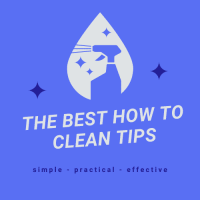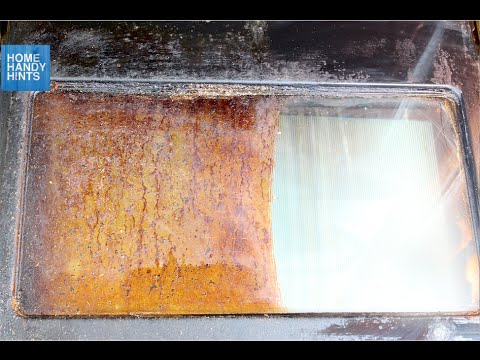One of the biggest torments that I had to face as a housewife was to go into the kitchen and look at the oven window, which gave me a terrible feeling of frustration. To clean it, I was used to buying specialized products for cleaning the oven, which I acquired at the supermarket, but I unconsciously refused to do this cleaning. This really happened to me because every time I did this job, the skin on my hands, even though I wore gloves, became irritated and had a very unpleasant itch.
The other thing that bothered me was the terrible and unpleasant smell that remained in my kitchen after that cleaning, the same thing happened to make some food that needed to be baked, I had to wait a long time, so that those foods did not have that taste to the cleaner.
All this led me to investigate how to clean oven glass and the oven, without using these products.
Why are commercial oven cleaners harmful?
Reading the ingredients that make up these cleaners on their labels, I found the reason that bothered me so much, and that is that these chemical compounds are extremely dangerous, I tell you about some of these compounds and the damage they can cause.
- Butane, is used as an organic solvent and is so dangerous to health that the substances that make it up are carcinogenic, but the danger is worse if it comes in an aerosol form, the particles that are spread in the air are inhaled by people who are around when it is applied, causing neurotoxicity and damaging the reproductive system of people, when this aerosol is activated it causes great damage to the environment by photochemical pollution.
- Monoethanolamine, when mixed with water produces a strong odor of ammonia is highly volatile, and because it is so harmful can cause headaches, cancer and nosebleeds. Ether, this component immediately causes nausea and irritation of the cornea.
- Caustic soda, is highly corrosive and burns the skin.
- Diethanolamine, is highly toxic if in contact with the skin and for the respiratory tract, it is also an eye irritant.
For all these reasons I decided to find out about other alternatives to clean oven glass, so that visitors to my kitchen can see the glowing oven window, and not get a bad image of this housewife. I found a way to make a cleaner that would leave the oven window clean and clear, without the danger of risking my health, because it is completely natural and harmless.
Making a home cleaning solution, to clean oven glass
Ingredients
- 4 tablespoons of baking soda
- 3 tablespoons of vinegar
- 1 Mixing bowl
- 2 lemons
Procedure
In the container I poured the vinegar, I began to add little by little the bicarbonate stirring to form a pasty substance, when I observed that it was foaming and had a creamy shape, I added the juice of the two lemons, stirring for 3 minutes, and I was ready my home cleaner to stop worrying for clean oven glass.
Here’s how to clean with your household cleaning solution
Clean oven glass with household cleaner
- I put a calendar 1 liter of water
- While the water heats up, I put a good amount of my household cleaner on it with a fiber sponge, and I pass it over the entire surface of the oven window on the inside.
- I repeat this action by wiping the outside of the oven window with a fiber sponge.
- After 15 minutes for the cleaner to loosen the dirt, food residue and grease.
- I wiped the surfaces of the oven window with a cloth soaked in hot water, where I scrubbed with the cleaner.
- Repeat the operation with the cloth soaked in hot water until no more traces of the cleaner remain.
- Finally, I wipe both sides of the oven window with a dry cloth.
After this operation, the oven window in my kitchen is really squeezed clean.
And best of all, my hands are not itchy, and I’m sure I haven’t been exposed to, or inhaled substances that are harmful to my health. I also have the peace of mind of knowing that the cleaner I’m using will not cause abrasive or corrosive damage to the walls of my kitchen oven.

